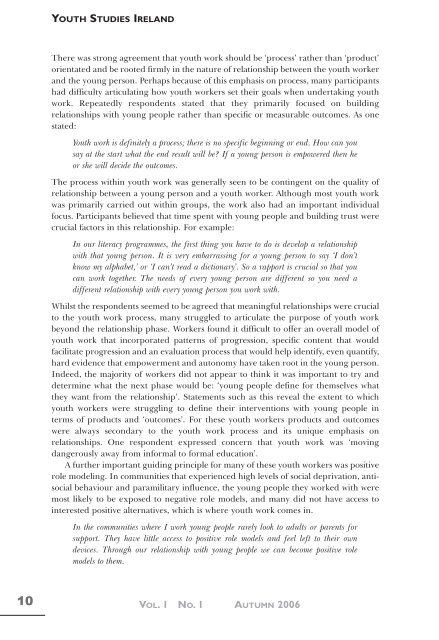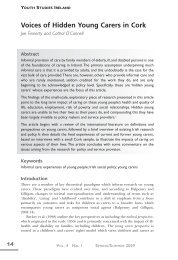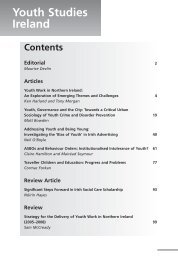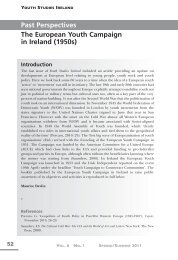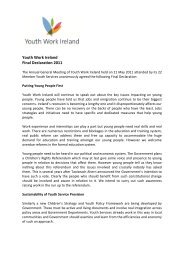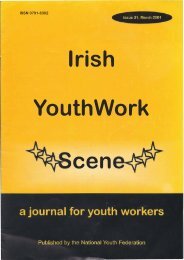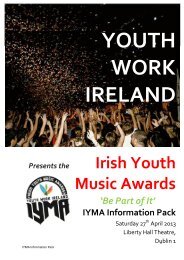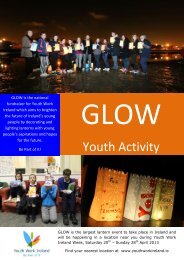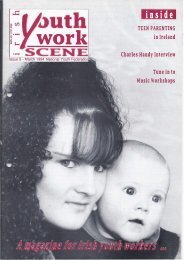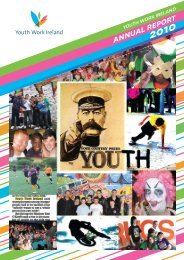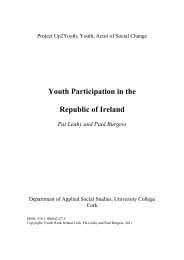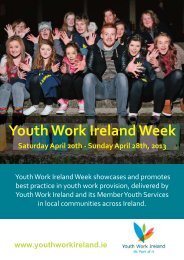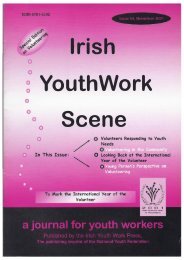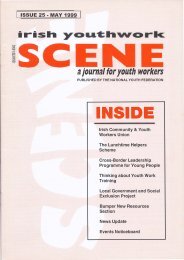Youth Work in Northern Ireland:
Youth Work in Northern Ireland:
Youth Work in Northern Ireland:
Create successful ePaper yourself
Turn your PDF publications into a flip-book with our unique Google optimized e-Paper software.
YOUTH STUDIES IRELANDThere was strong agreement that youth work should be ‘process’ rather than ‘product’orientated and be rooted firmly <strong>in</strong> the nature of relationship between the youth workerand the young person. Perhaps because of this emphasis on process, many participantshad difficulty articulat<strong>in</strong>g how youth workers set their goals when undertak<strong>in</strong>g youthwork. Repeatedly respondents stated that they primarily focused on build<strong>in</strong>grelationships with young people rather than specific or measurable outcomes. As onestated:<strong>Youth</strong> work is def<strong>in</strong>itely a process; there is no specific beg<strong>in</strong>n<strong>in</strong>g or end. How can yousay at the start what the end result will be? If a young person is empowered then heor she will decide the outcomes.The process with<strong>in</strong> youth work was generally seen to be cont<strong>in</strong>gent on the quality ofrelationship between a young person and a youth worker. Although most youth workwas primarily carried out with<strong>in</strong> groups, the work also had an important <strong>in</strong>dividualfocus. Participants believed that time spent with young people and build<strong>in</strong>g trust werecrucial factors <strong>in</strong> this relationship. For example:In our literacy programmes, the first th<strong>in</strong>g you have to do is develop a relationshipwith that young person. It is very embarrass<strong>in</strong>g for a young person to say ‘I don’tknow my alphabet,’ or ‘I can’t read a dictionary’. So a rapport is crucial so that youcan work together. The needs of every young person are different so you need adifferent relationship with every young person you work with.Whilst the respondents seemed to be agreed that mean<strong>in</strong>gful relationships were crucialto the youth work process, many struggled to articulate the purpose of youth workbeyond the relationship phase. <strong>Work</strong>ers found it difficult to offer an overall model ofyouth work that <strong>in</strong>corporated patterns of progression, specific content that wouldfacilitate progression and an evaluation process that would help identify, even quantify,hard evidence that empowerment and autonomy have taken root <strong>in</strong> the young person.Indeed, the majority of workers did not appear to th<strong>in</strong>k it was important to try anddeterm<strong>in</strong>e what the next phase would be: ‘young people def<strong>in</strong>e for themselves whatthey want from the relationship’. Statements such as this reveal the extent to whichyouth workers were struggl<strong>in</strong>g to def<strong>in</strong>e their <strong>in</strong>terventions with young people <strong>in</strong>terms of products and ‘outcomes’. For these youth workers products and outcomeswere always secondary to the youth work process and its unique emphasis onrelationships. One respondent expressed concern that youth work was ‘mov<strong>in</strong>gdangerously away from <strong>in</strong>formal to formal education’.A further important guid<strong>in</strong>g pr<strong>in</strong>ciple for many of these youth workers was positiverole model<strong>in</strong>g. In communities that experienced high levels of social deprivation, antisocialbehaviour and paramilitary <strong>in</strong>fluence, the young people they worked with weremost likely to be exposed to negative role models, and many did not have access to<strong>in</strong>terested positive alternatives, which is where youth work comes <strong>in</strong>.In the communities where I work young people rarely look to adults or parents forsupport. They have little access to positive role models and feel left to their owndevices. Through our relationship with young people we can become positive rolemodels to them.10 VOL. 1 NO. 1 AUTUMN 2006


